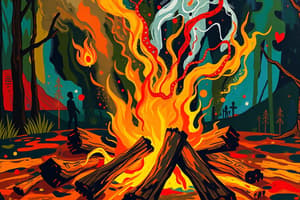Podcast
Questions and Answers
6 C's of survival
6 C's of survival
Study the area you are in. Are you in a dangerous
situation where you need to move immediately or
can you hunker down and think? What is going on
around you? Listen to the sound of birds, the sound
of nature, or other activities going on around you.
Check your equipment, take a quick inventory and
assess the condition of your supplies. Check yourself
and if there are others with you, check them too. Is
everyone okay? Does everyone have shelter, food
water, or other necessities? If not, can you where
will you get it?
Study the area you are in. Are you in a dangerous situation where you need to move immediately or can you hunker down and think? What is going on around you? Listen to the sound of birds, the sound of nature, or other activities going on around you. Check your equipment, take a quick inventory and assess the condition of your supplies. Check yourself and if there are others with you, check them too. Is everyone okay? Does everyone have shelter, food water, or other necessities? If not, can you where will you get it?
SIZE UP THE SITUATION
Don’t react before you think, as this could
cause you to make a mistake. Use all your
senses to observe the area around you.
Take note of sounds, smells, touch, taste,
and even listen to your sixth sense. Plan
and prepare and whenever possible, make
a well thought out decision before you
make your next move.
Don’t react before you think, as this could cause you to make a mistake. Use all your senses to observe the area around you. Take note of sounds, smells, touch, taste, and even listen to your sixth sense. Plan and prepare and whenever possible, make a well thought out decision before you make your next move.
Do you have a map and compass? If so,
use the compass and map to determine
your exact location using terrain
association and other navigation skills.
Look around. Does anything look
familiar? Are there any dangers that you
are aware of? Where are the safe areas?
Where is there water, shelter, food or
other resources?
Do you have a map and compass? If so, use the compass and map to determine your exact location using terrain association and other navigation skills. Look around. Does anything look familiar? Are there any dangers that you are aware of? Where are the safe areas? Where is there water, shelter, food or other resources?
Look carefully at the situation and
determine if your fear is justified.
You will usually find that most of
your fear are imagined.
• Injury, pain, or loneliness can
cause panic. Planning your
escape can keep your mind busy
Look carefully at the situation and determine if your fear is justified. You will usually find that most of your fear are imagined. • Injury, pain, or loneliness can cause panic. Planning your escape can keep your mind busy
Use your imagination to find ways to use
whatever you have or what nature provides.
Be creative and work efficiently
Use your imagination to find ways to use whatever you have or what nature provides. Be creative and work efficiently
Think about what makes you
happy and gives you a reason to
live. Nothing is too small so
long as it keeps you going. Stay
strong and never lose hope.
Think about what makes you happy and gives you a reason to live. Nothing is too small so long as it keeps you going. Stay strong and never lose hope.
If you’re stranded in unfamiliar
territory, watch the natives’ even if the
natives are animals. Where are they
eating, where they get water, are the
fleeing from something else besides
you? Observe and learn from them.
If you’re stranded in unfamiliar territory, watch the natives’ even if the natives are animals. Where are they eating, where they get water, are the fleeing from something else besides you? Observe and learn from them.
TRUST YOUR INSTINCTS
LEARN BASIC SKILLS
TRUST YOUR INSTINCTS LEARN BASIC SKILLS
MEANING OF A.C.T
MEANING OF A.C.T
EDC
EDC
8 SURVIVAL TIPS
8 SURVIVAL TIPS
WHAT ARE THE EVERYDAY CARRY
WHAT ARE THE EVERYDAY CARRY
GO BAG (8)
GO BAG (8)
ONE WHISTLE CODE MEANS..
ONE WHISTLE CODE MEANS..
2 WHISTLE CODE MEANS..
2 WHISTLE CODE MEANS..
3 WHISTLE CODE MEANS..
3 WHISTLE CODE MEANS..
Flashcards
SIZE UP THE SITUATION
SIZE UP THE SITUATION
The first 'C' in survival, involves assessing your situation by observing your surroundings, inventorying supplies, and checking on yourself and others.
Don’t React Before You Think.
Don’t React Before You Think.
Don't rush into action without thinking. Observe your surroundings using all your senses and develop a plan before making any moves.
Determine Your Exact Location
Determine Your Exact Location
Use a map and compass to pinpoint your location by matching terrain features and navigation skills. Identify safe areas and potential resources.
Overcome Fear and Panic
Overcome Fear and Panic
Signup and view all the flashcards
Use Your Imagination
Use Your Imagination
Signup and view all the flashcards
Think About What Makes You Happy
Think About What Makes You Happy
Signup and view all the flashcards
Watch the Natives
Watch the Natives
Signup and view all the flashcards
Trust your instincts.
Trust your instincts.
Signup and view all the flashcards
MEANING OF A.C.T
MEANING OF A.C.T
Signup and view all the flashcards
EDC
EDC
Signup and view all the flashcards
GO BAG
GO BAG
Signup and view all the flashcards
One Whistle Code Means:
One Whistle Code Means:
Signup and view all the flashcards
2 Whistle Code Means:
2 Whistle Code Means:
Signup and view all the flashcards
3 Whistle Code Means:
3 Whistle Code Means:
Signup and view all the flashcards
Everyday Carry (EDC)
Everyday Carry (EDC)
Signup and view all the flashcards
Go-Bag
Go-Bag
Signup and view all the flashcards
Whistle Codes
Whistle Codes
Signup and view all the flashcards




